Innovations from Serbia at the World Circular Economy Forum in Brussels
April 12, 2024

Belgrade, April 12, 2024 – With the support of the Ministry of Environmental Protection, the United Nations Development Programme (UNDP), will present the best innovations from Serbia for reducing waste and converting waste into new raw materials, at the World Circular Economy Forum 2024 (WCEF2024), which will take place in Brussels from 15 to 18 April. This global event is dedicated to cutting-edge solutions in the field of circular economy based on the latest scientific evidence.
UNDP and the Ministry will present more than 60 innovations from Serbia to the visitors of WCEF2024. These solutions include the production of biodegradable cups and bags, food coloring and adhesives for industry and construction from fruit and vegetable waste, the use of textile waste and waste glass to make building materials, cigarette packs and surplus printing paper to make handmade paper and boxes, old newspapers to make pencils and crayons, and driftwood from rivers to make exercise equipment, as well as the recycling of old cables to produce copper and aluminium granulate. The presentation will also include an information system that automates the cultivation of plants in biodegradable pots, as well as new digital (IoT-Internet of things) devices that measure the amount of waste and identify the type of waste in containers in order to optimise collection.
Within a dedicated session on insects-based waste reduction solutions, on 18 April, an innovative solution from the Belgrade company "Belinda Animals" and the Institute for Biological Research "Siniša Stanković" will be presented, along with examples from South Africa and Lesotho. This solution has proven that mealworm larvae can feed on Styrofoam and completely decompose it into protein-rich organic material which is ideal for livestock feed production. It will be possible to attend this session online, with registration open by the end of Friday, 12 April at this link.
These examples, along with case studies from around the world, will help business leaders, decision-makers and experts reflect on how economy and science can work together to meet human needs in a way that is in harmony with nature, which involves conserving resources, extending the lifespan of materials, reducing waste pollution and CO2 emissions, while also enabling manufacturers to save money and become more competitive on the market. The forum also provides an opportunity for creators of circular economy solutions to meet innovators from other countries and further develop their ideas together.
Since 2022, 65 circular economy innovations from Serbia have received $2.8 million for implementation in total. This support has been provided by the European Union, the Government of Switzerland, and the Global Environment Facility (GEF), within the two initiatives implemented by UNDP in partnership with the Ministry of Environmental Protection: "EU for Green Agenda in Serbia" and "Reducing the carbon footprint of local communities by applying the principles of the circular economy in the Republic of Serbia - Circular Communities".


 Locations
Locations